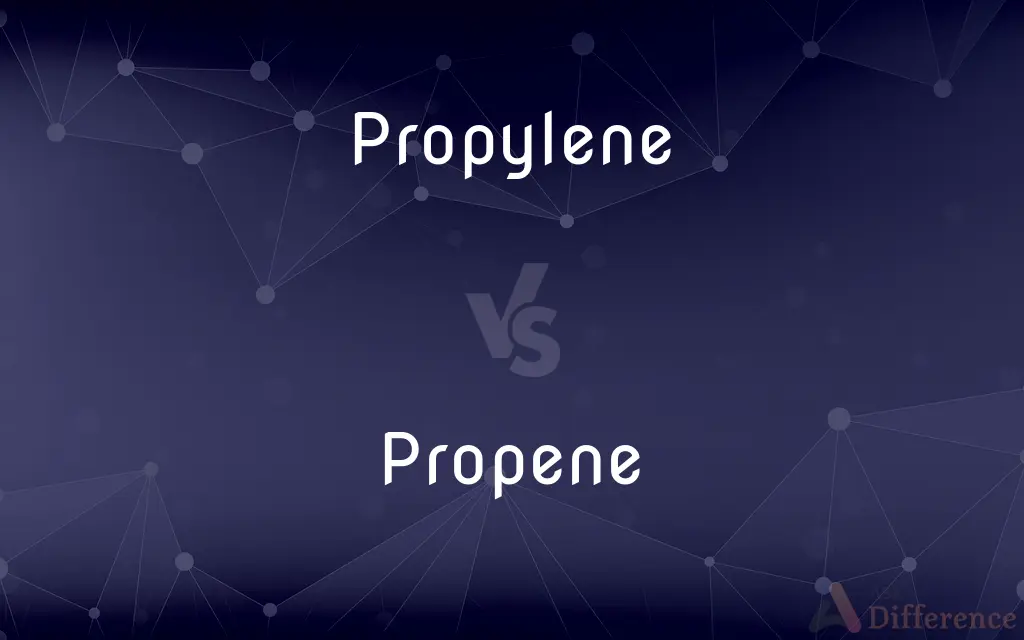Propylene vs. Propene — What's the Difference?
By Tayyaba Rehman & Urooj Arif — Updated on April 15, 2024
Propylene and propene refer to the same chemical compound, C3H6; however, "propylene" is the older term, often used in industry, while "propene" is preferred in scientific contexts.

Difference Between Propylene and Propene
Table of Contents
ADVERTISEMENT
Key Differences
Propylene is commonly used in industrial settings and everyday language, especially within the plastics and synthetic fibers industries. On the other hand, propene is favored in scientific literature and academic discussions, reflecting the systematic naming conventions of chemistry.
Propylene is often mentioned in the context of commercial products and processes, such as the manufacturing of polypropylene, a common plastic. Whereas propene is typically referenced in research and chemical equations, emphasizing its molecular structure and reactions.
In terms of nomenclature, "propylene" derives from the older, less systematic naming tradition in chemistry. On the other hand, "propene" aligns with the IUPAC naming system, which provides a more standardized approach to naming chemical compounds.
Documentation and safety data sheets in industrial environments often list the compound as propylene. In contrast, scientific publications and educational materials will almost exclusively use the term propene.
Many companies and product labels will use the term propylene to maintain consistency with existing industry norms. Conversely, academic and research settings prioritize propene to ensure clarity and alignment with international scientific standards.
ADVERTISEMENT
Comparison Chart
Naming
Older, traditional term
Preferred in scientific contexts
Usage Context
Industrial, commercial
Academic, research
Documentation
Common in industry
Preferred in scientific literature
Nomenclature
Non-systematic, traditional
Systematic, IUPAC standards
Industry Standard
Often used in product names
Used in academic discussions
Compare with Definitions
Propylene
A flammable hydrocarbon gas used as a fuel and a petrochemical feedstock.
Propylene is processed in refineries to produce polypropylene.
Propene
Critical in the study of petrochemical processes.
The conversion of propene to polypropylene is a key industrial reaction.
Propylene
An older chemical term for propene, particularly in industrial contexts.
Propylene tanks are commonly found in chemical plants.
Propene
The IUPAC name for a molecule commonly known in industry as propylene.
Propene is studied in chemistry for its reactivity.
Propylene
Used in the manufacturing of alcohol, solvents, and antifreeze.
Propylene glycol is derived from propylene.
Propene
Involved in polymerization reactions to create plastics.
Polypropylene is made by polymerizing propene.
Propylene
Essential for the synthesis of many chemical compounds and products.
Propylene is used in the production of acrylics and propylene oxide.
Propene
Used predominantly in scientific and academic settings.
Propene is often used in organic synthesis laboratories.
Propylene
A key ingredient in the production of plastics and synthetic materials.
Propylene is converted into various types of polymers.
Propene
A colorless gas in the alkene class, with a double bond in its carbon chain.
Propene reacts with hydrogen in the presence of a catalyst.
Propylene
A flammable gaseous alkene, C3H6, derived from petroleum hydrocarbon cracking and used in organic synthesis. Also called propene.
Propene
Propene, also known as propylene, is an unsaturated organic compound with the chemical formula CH 3 CH = CH 2 {\displaystyle {\ce {CH3CH=CH2}}} . It has one double bond, and is the second simplest member of the alkene class of hydrocarbons.
Propylene
(organic compound) The organic chemical compound propene. An alkene which is a colorless gaseous (at room temperature and pressure) hydrocarbon with the chemical formula C3H6.
Propene
See propylene.
Propylene
A colorless gaseous hydrocarbon (C3H6) of the ethylene series, having a garlic odor. It occurs in coal gas, and is produced artificially in various ways. Called also propene.
Propene
The organic chemical compound propylene. An alkene which is a colorless gaseous (at room temperature and pressure) hydrocarbon with the chemical formula C3H6.
Propylene
A flammable gas obtained by cracking petroleum; used in organic synthesis
Propene
Same as Propylene.
Propene
A flammable gas obtained by cracking petroleum; used in organic synthesis
Common Curiosities
Are propylene and propene the same?
Yes, they refer to the same chemical compound but are used in different contexts.
What is propene?
Propene is the scientific term for the molecule C3H6, consistent with IUPAC nomenclature.
Why is propene preferred in academic settings?
Propene is used in academic settings due to its alignment with systematic scientific naming conventions.
How is propylene obtained?
Propylene is typically produced during oil refining and natural gas processing.
What are the safety concerns with propylene?
As a flammable gas, propylene poses risks of fire and explosion.
What is propylene?
Propylene is an industrial name for the chemical compound C3H6, commonly used in the manufacturing of plastics.
Is propene natural or synthetic?
Propene is obtained through both natural processes and synthetic methods in petrochemical industries.
How does propene react chemically?
Propene is reactive due to its double bond, participating in addition reactions.
Can propylene and propene be used interchangeably?
While they can technically be used interchangeably, the choice of term often depends on the context—industrial vs. scientific.
Why do industries prefer the term propylene?
Industries use propylene because it aligns with traditional naming and existing commercial practices.
What role does propene play in organic chemistry?
Propene is fundamental in organic synthesis, serving as a building block for many compounds.
What products are made from propylene/propene?
Both are used to make polypropylene, a common plastic, among other products.
What environmental impact does propene/propylene have?
Propene and propylene contribute to environmental concerns like air pollution and are subject to regulation.
What is the difference in the molecular structure of propylene and propene?
There is no structural difference; the difference lies solely in the naming convention used.
What is the global market like for propene/propylene?
The global market for propene is robust, driven by demand for polymers like polypropylene.
Share Your Discovery

Previous Comparison
Content vs. Contempt
Next Comparison
Coordinator vs. OfficerAuthor Spotlight
Written by
Tayyaba RehmanTayyaba Rehman is a distinguished writer, currently serving as a primary contributor to askdifference.com. As a researcher in semantics and etymology, Tayyaba's passion for the complexity of languages and their distinctions has found a perfect home on the platform. Tayyaba delves into the intricacies of language, distinguishing between commonly confused words and phrases, thereby providing clarity for readers worldwide.
Co-written by
Urooj ArifUrooj is a skilled content writer at Ask Difference, known for her exceptional ability to simplify complex topics into engaging and informative content. With a passion for research and a flair for clear, concise writing, she consistently delivers articles that resonate with our diverse audience.














































